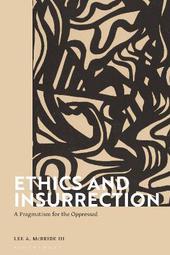
|
Ethics and Insurrection: A Pragmatism for the Oppressed
Hardback
Main Details
| Title |
Ethics and Insurrection: A Pragmatism for the Oppressed
|
| Authors and Contributors |
By (author) Lee A. McBride III
|
| Physical Properties |
| Format:Hardback | | Pages:144 | | Dimensions(mm): Height 234,Width 156 |
|
| Category/Genre | Ethics and moral philosophy
Social and political philosophy |
|---|
| ISBN/Barcode |
9781350102279
|
| Classifications | Dewey:171.2 |
|---|
| Audience | | Tertiary Education (US: College) | |
|---|
|
Publishing Details |
| Publisher |
Bloomsbury Publishing PLC
|
| Imprint |
Bloomsbury Academic
|
| Publication Date |
28 January 2021 |
| Publication Country |
United Kingdom
|
Description
Ethics and Insurrection articulates an ethical position that takes critical pragmatism and Harrisian insurrectionist philosophy seriously. It suggests that there are values and norms that create boundaries that confine, reduce and circumscribe the actions we allow ourselves to consider. McBride argues that an insurrectionist ethos is integral in the disavowing of norms and traditions that justify or perpetuate oppression and that we must throw our faith behind something, some set of values, if we want a chance at shaping a future. This book encourages us to (re)imagine and shape futures with less subjection, less degradation. It urges us to interrogate and deconstruct those intervening background assumptions that authorize and reinforce the subordination of stigmatized groups. It implores us to pursue new conceptions of personhood and humanity, conceptions that forefront reciprocity and solidarity-conceptions that do not cast groups of human beings as inherently subhuman or naturally bereft of honor. And finally Ethics and Insurrection beseeches us to form new coalitions and bonds of trust, to engage in those forms of collective action likely to shape a better future.
Author Biography
Lee A. McBride III is Professor of Philosophy at the College of Wooster, USA. He is the editor of A Philosophy of Struggle: The Leonard Harris Reader (Bloomsbury, 2020).
ReviewsIn Ethics and Insurrection, Lee McBride III brings together Deweyan pragmatic ethical naturalism and insurrectionist ethics. The result is a demystification of philosophy on behalf of those whose voices are ignored by standard philosophical discourse and a proposal to replace that discourse with a pragmatism for the oppressed. * Dwayne A. Tunstall, Associate Professor of Philosophy, Grand Valley State University, USA * Philosophical pragmatism today sometimes runs the risk of being bogged down in endless academic debates. To paraphrase James, we are now at a stage where it is no longer attacked as absurd, somewhat admitted to being true and obvious, and safely confined to the territories of exegesis and -isms warring with other -isms (as well as -icisms, of course). McBride's book is an attempt to break free from such constraints, carrying no other flag than that of the pragmatist who still believes in social progress and philosophy's role in working towards it. He offers a spirited defence of ethical naturalism that eschews materialist and scientistic dead-ends which will hopefully be taken up by a like-minded community of inquirers, academic and otherwise. * Mara-Daria Cojocaru, Lecturer in Practical Philosophy, Munich School of Philosophy, Germany * A provocative, creative and challenging account of ethical naturalism that makes us see why an ethos of insurrection is vital to any democracy and struggle for human liberation. Stepping over the dead-pan world of professional moral philosophy, McBride provides an optimism in the face of cruel choices. If there is a form of pragmatism that can provide motivation - the transvaluation of values - to struggle against forced prostitution, child servitude and racist exploitation, McBride purports provide its depiction. It takes the ethics of insurrection and shows its universality. With the ethos of the ethics of insurrection and democratic sensibilities, McBride fashions a walkway of arguments and pictures. McBride carves a space between critical pragmatist experimentalism and an insurrectionist ethics - the space is where we want our choices not to harm anyone as we test different ethical choices and where nothing allows for our choices to be anything but harmless. * Leonard Harris, Professor of Philosophy, Purdue University, USA *
|